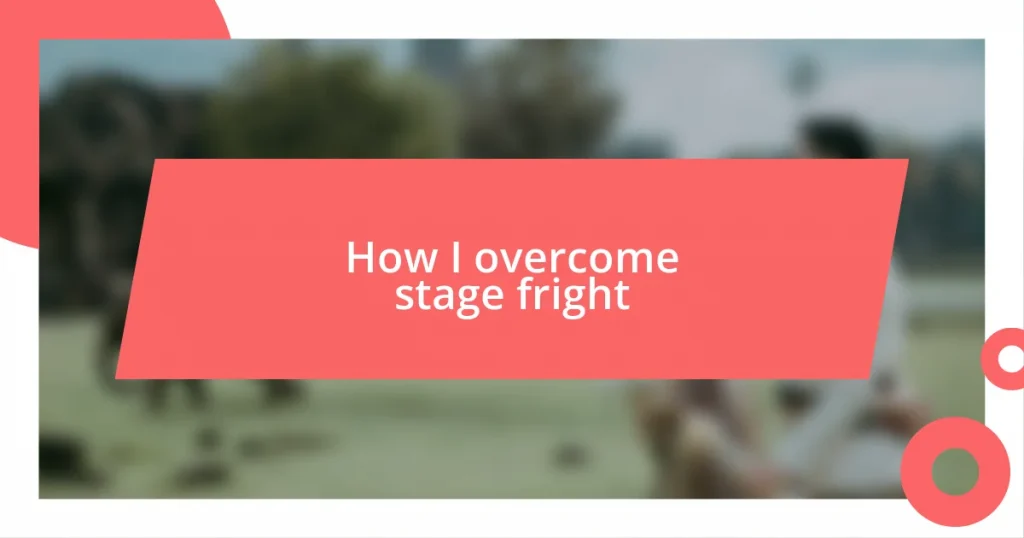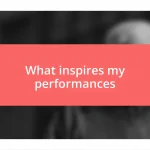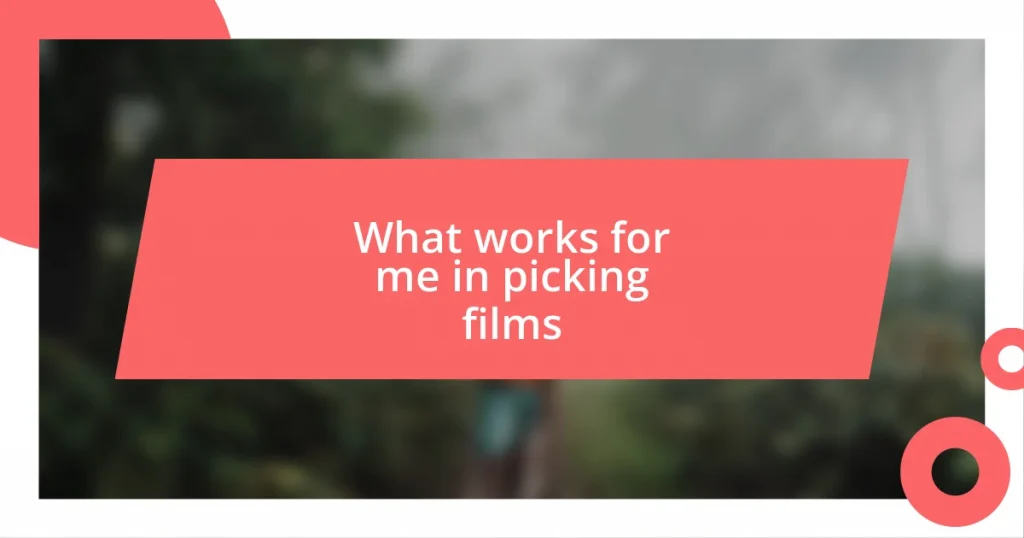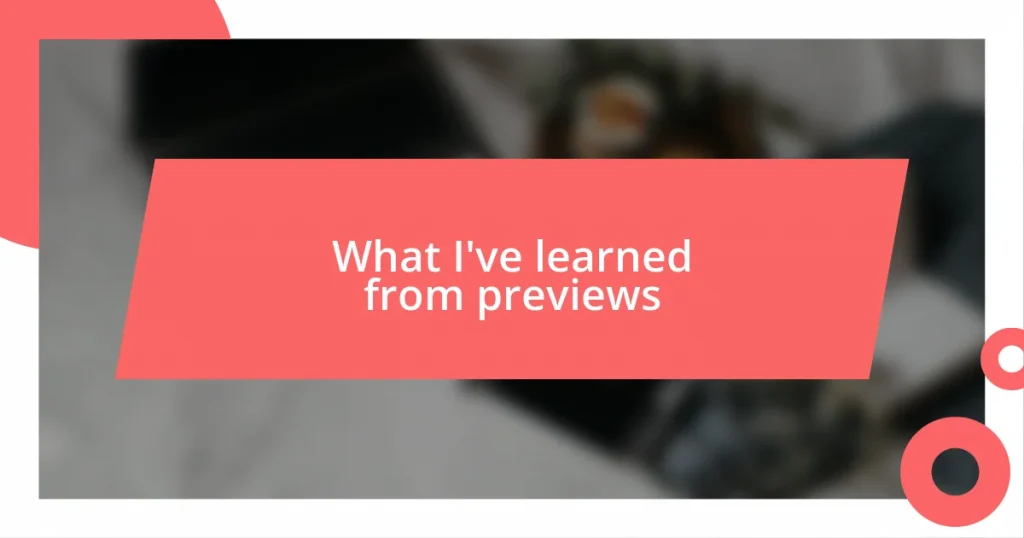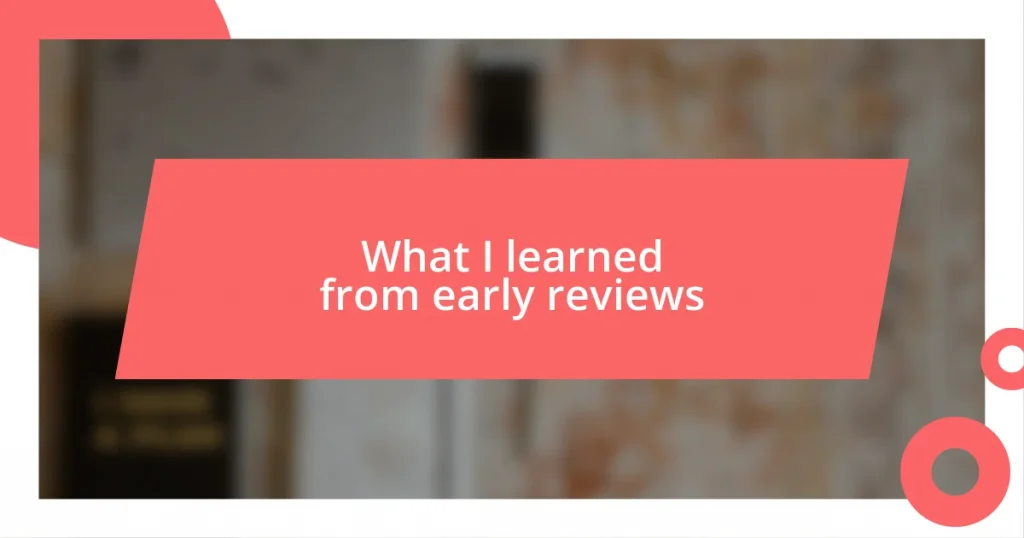Key takeaways:
- Understanding stage fright involves recognizing its common roots, such as fear of judgment and past experiences, which can help reframe anxiety into a more manageable feeling.
- Developing a structured preparation routine, including vocal exercises, rehearsal, breathing techniques, and self-reflection, significantly enhances performance confidence and reduces nerves.
- Utilizing positive self-talk and seeking professional help when necessary can transform one’s approach to stage fright and empower growth in both performance and everyday life.
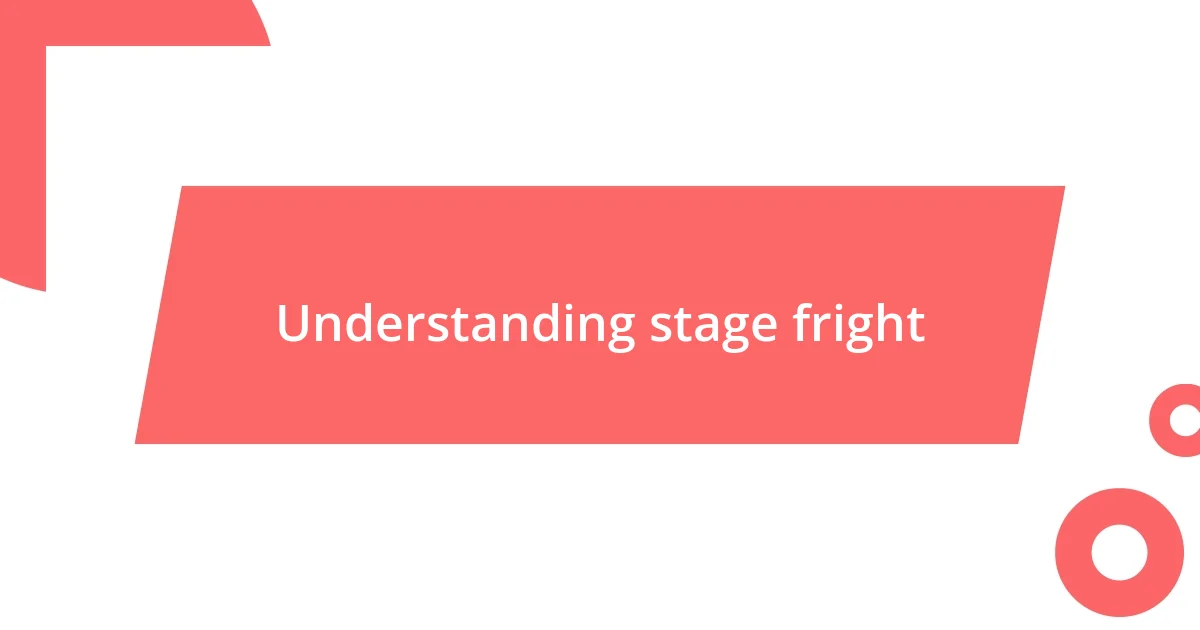
Understanding stage fright
Stage fright is a universal experience, and understanding it can be the first step toward overcoming it. I still remember the rush of anxiety I felt before stepping onto the stage for my first performance—my heart raced, palms clammy, and a swirl of doubt made me question my abilities. Isn’t it fascinating how our minds can build a mountain from a molehill, turning excitement into fear?
At its core, stage fright often stems from the fear of judgment. I found myself standing there, imagining the audience’s critical eyes dissecting every move I made. Have you ever felt that intense pressure, thinking that every mistake would be magnified under the spotlight? It’s a feeling that can be paralyzing, yet acknowledging that these feelings are common can be liberating.
Interestingly, I discovered that understanding the physiological reactions that come with stage fright helped contextualize my experience. It’s just adrenaline—I’ll feel it in my body, but it doesn’t define my performance. Isn’t it reassuring to realize that what you’re experiencing is simply a natural response? Once I reframed my mindset, I began to shift my focus from the audience’s perception to my passion for sharing my message.
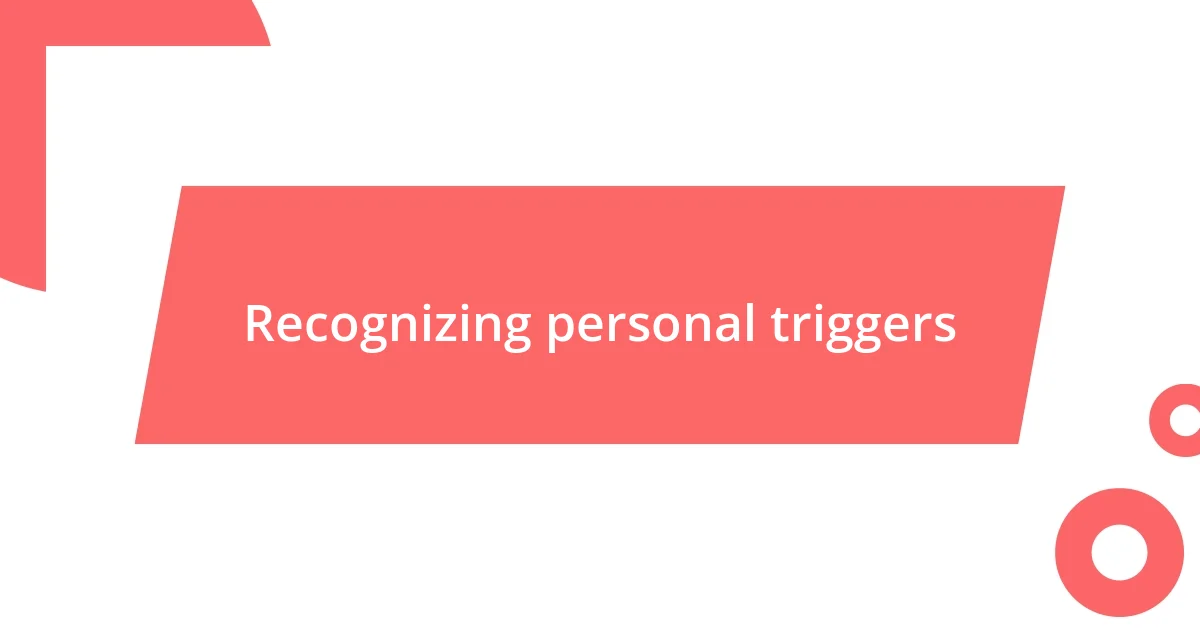
Recognizing personal triggers
Recognizing personal triggers can feel like peeling back layers of an onion. It’s not just about the physical symptoms; it often connects deeply with past experiences. For me, one of my biggest triggers was the memory of my school presentation that went horribly wrong. I could still hear the awkward laughter echoing in my mind. By identifying that specific moment, I realized that the fear of embarrassment was rooted in that memory, and confronting it helped me transform those feelings into motivation.
Understanding your triggers involves being observant and reflective. Here are some common triggers I’ve noticed and how they might resonate with you:
- Past experiences: A specific event that haunts your memory, like a failed performance.
- Fear of judgment: Anticipating critical comments from the audience can be overwhelming.
- Perfectionism: The pressure to deliver flawlessly makes the stakes feel impossibly high.
- Physical sensations: Recognizing how anxiety manifests in your body, like a racing heart or sweating palms.
- Preparation levels: Feeling unprepared can escalate anxiety, so it’s important to have solid practice time.
By pinpointing these triggers, you can gain a clearer perspective on your anxiety, making it more manageable.
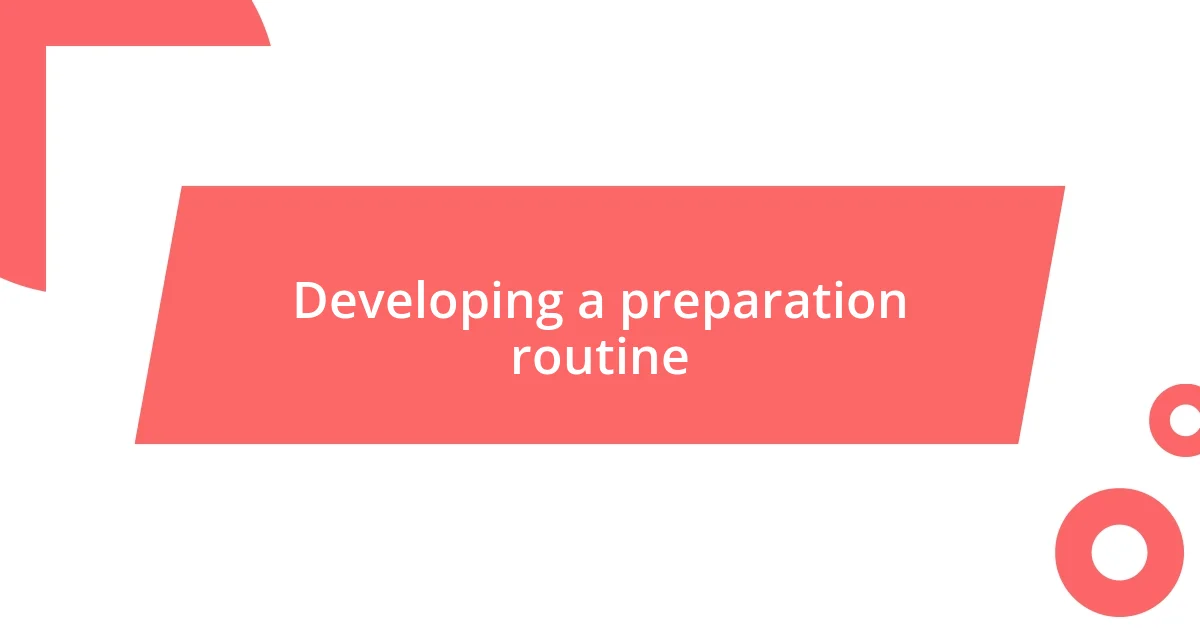
Developing a preparation routine
Developing a preparation routine can significantly alleviate the worries that come with stage fright. Personally, I find that having a structured plan creates a sense of control. I commit to a mix of vocal exercises, breathing techniques, and visualization of my performance, which helps ease those pre-performance jitters. Doesn’t it help to think about your preparations like gearing up for a big game?
Another key aspect I discovered is the importance of rehearsal in my routine. In the past, I skimped on practice, and it showed in my performances. However, incorporating consistent, quality practice sessions has become a game changer for me. I recall one show where I practiced daily, and each time I felt myself growing more confident. Wouldn’t you agree that solid preparation can transform those nerves into excitement?
Lastly, I learned that incorporating a time for self-reflection after practice is invaluable. While preparing is crucial, reflecting on what went well and what can be improved nurtures growth. This routine not only enhances my performance but also boosts my confidence. I remember taking a moment after a recent rehearsal to jot down my successes and areas for growth. It felt empowering to acknowledge progress, wouldn’t you say?
| Preparation Element | Description |
|---|---|
| Vocal Exercises | Helps calm nerves and warms up your voice. |
| Rehearsal Schedule | Regular practice builds familiarity and confidence. |
| Breathing Techniques | Serves to reduce anxiety and center focus. |
| Self-Reflection | Encourages personal growth through acknowledging progress. |
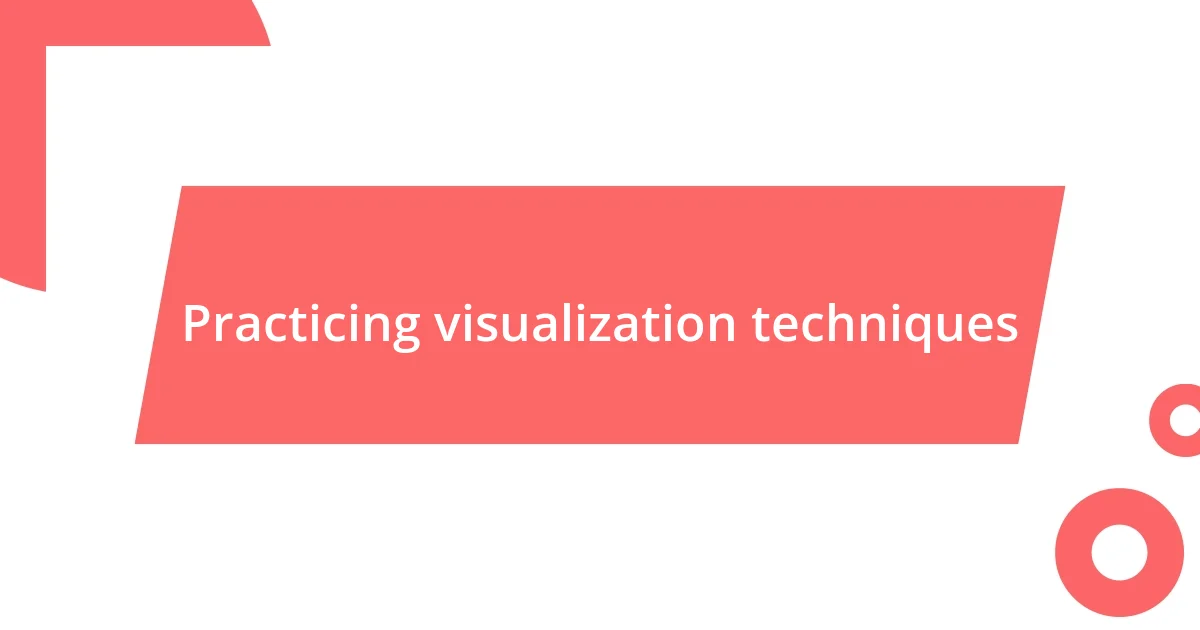
Practicing visualization techniques
Practicing visualization techniques has been a transformative tool in my journey with stage fright. I remember standing backstage for a big presentation, my heart racing and palms sweaty. In that moment, I closed my eyes and imagined myself walking onto the stage, fully confident, engaging the audience with ease. This mental picture created a sense of calm that surprisingly felt as real as the actual performance. Have you ever tried to visualize yourself succeeding? It’s an incredibly empowering exercise!
I make it a habit to practice visualization regularly. Before every performance, I take a few minutes to visualize not just the act itself, but all the little details—like the feel of the microphone in my hand or the smiling faces in the front row. This process serves as a mental rehearsal that primes my brain for success. It’s like rehearsing in a dream, where I can tweak my performance until it feels perfect. Doesn’t it feel great to have that mental dress rehearsal?
What’s fascinating is how visualization impacts my emotions. When I visualize, I don’t just see; I feel the excitement of the audience’s applause and the thrill of delivering my message powerfully. It helps shift anxiety into anticipation. I’ve found that when I combine this technique with deep breathing, I walk on stage feeling like I’ve already succeeded, as if I’ve been there before. Have you ever thought about how powerful your imagination can be in shaping your reality? It’s a game changer.
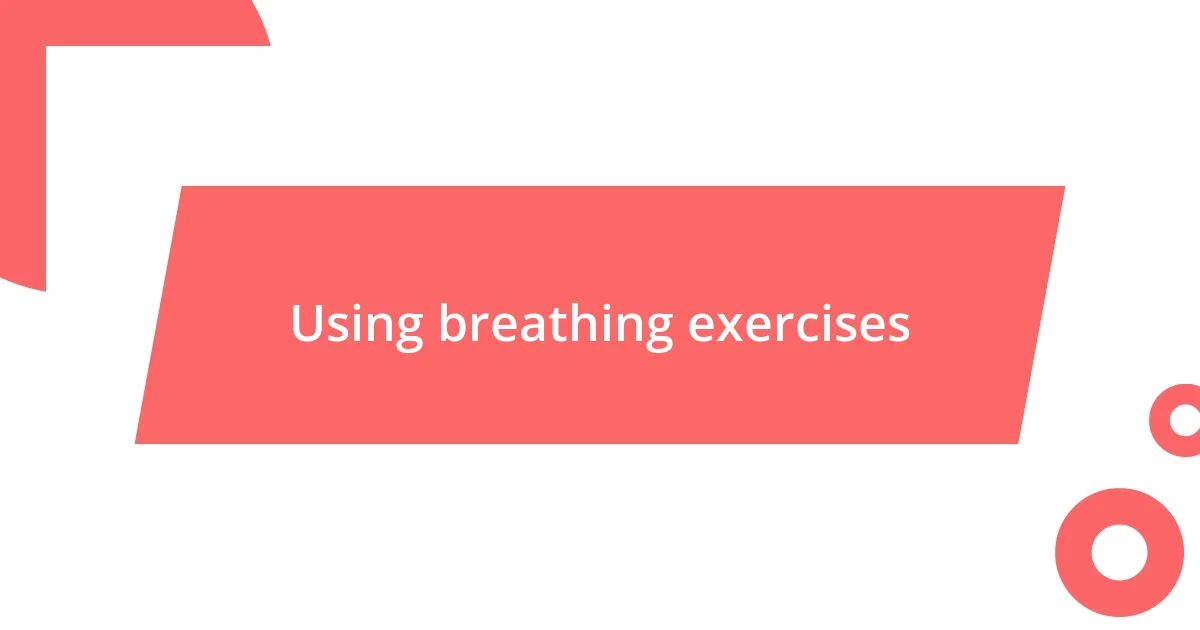
Using breathing exercises
Breathing exercises are a cornerstone of my routine when it comes to managing stage fright. I often find a quiet corner before stepping onto the stage and take a moment to focus on my breath. Inhaling deeply through my nose for a count of four, holding for four, and then exhaling slowly through my mouth for another four helps ground me. It’s incredible how something as simple as conscious breathing can shift your entire emotional state. Have you ever noticed how calming it feels to just breathe?
There was a time when my nerves would get the best of me, especially before a presentation with a large audience. One evening, I vividly recall sitting backstage, feeling the rush of anxiety flood over me. In that moment, I closed my eyes, inhaled deeply, and repeated a calming mantra with each breath. The world outside faded away, and I emerged feeling a renewed sense of clarity and focus. Isn’t it fascinating how just a few moments of mindful breathing can take you from chaos to calm?
Incorporating breathing exercises into my daily routine has transformed not just my performances but my overall mindset toward anxiety. Now, before any high-pressure situation, whether it’s a speech or a casual gathering, I take those deep breaths first. The difference is noticeable; I feel centered and present. How do you handle those pre-performance jitters? Sometimes, it’s about revisiting the basics and just remembering to breathe deeply; it is truly a game changer.
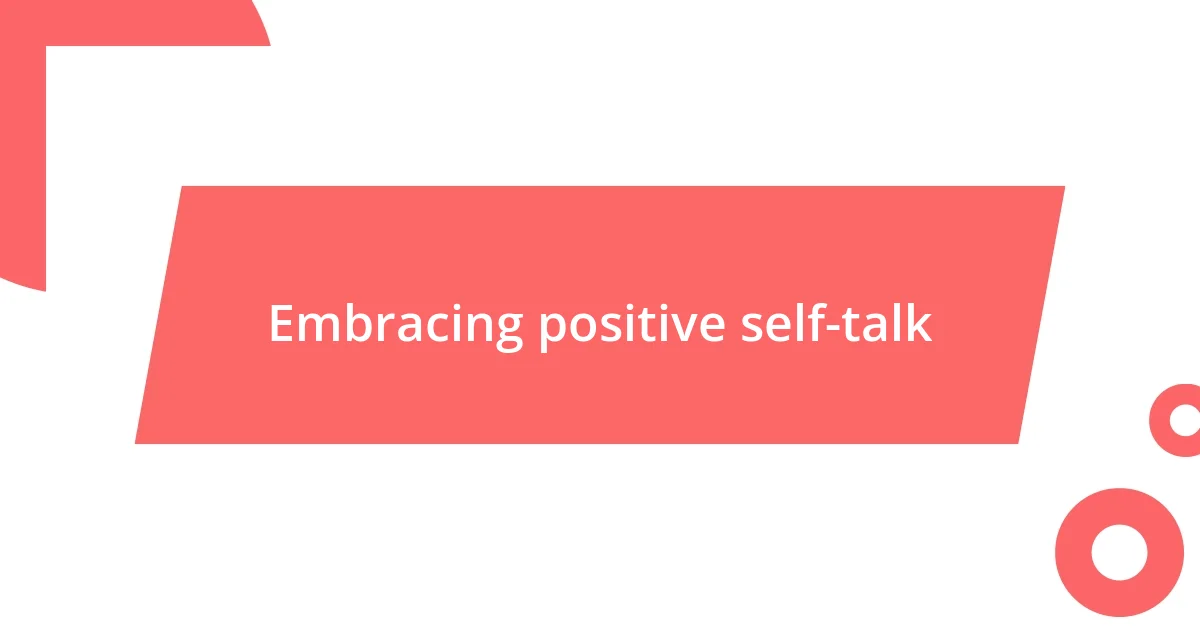
Embracing positive self-talk
Embracing positive self-talk
Positive self-talk has been my secret weapon against stage fright. I vividly recall a rehearsal where self-doubt crept in like a shadow, whispering that I would stumble through my lines. In that moment, I consciously shifted my internal dialogue, replacing the negativity with affirmations like “I am prepared” and “I can do this.” It’s astonishing how changing those few words sparked a surge of confidence. Have you ever tried talking yourself through a tough moment? It can be transformative!
What I’ve found incredibly impactful is creating a list of affirmations tailored to my experiences. For instance, after a particularly shaky speech, I wrote down phrases like “Every attempt is a step toward improvement” and “The audience wants me to succeed.” Reading these affirmations before stepping into any performance sets a positive tone and reinforces my belief in myself. It’s like arming myself with a shield against my doubts. How different would your mindset be if you had reminders of your strengths ready to go?
I’ve also made it a practice to share my positive self-talk with friends who face similar challenges. During a particularly nerve-wracking workshop, I encouraged a friend who was struggling with her confidence. As we stood backstage, I helped her rehearse affirmations, and together we spoke them aloud. The look of relief on her face confirmed my belief: supporting one another makes a difference. Isn’t it amazing how uplifting words can create a ripple effect? In embracing positive self-talk, I’ve not only reinforced my confidence but also helped others feel empowered, turning jitters into an exhilarating experience.

Seeking professional help if needed
There have been times when my own strategies fell short, and that’s when I realized seeking professional help was essential. Consulting with a therapist who specializes in performance anxiety brought a new perspective. They introduced me to cognitive-behavioral techniques that not only challenged my negative thoughts but also equipped me with the coping skills I needed for high-pressure situations. Have you ever felt like talking to someone could unlock a path forward?
I once attended a workshop led by a performance coach, which turned out to be a game changer. The coach created a safe space where I could share my fears and learn from others. There’s something incredibly powerful about being in a room full of people who understand your struggles. Together, we practiced techniques that unraveled my anxieties and made me realize I was not alone in this journey. Isn’t it comforting to know there’s support available when you need it?
Moreover, professional guidance has provided me with tools that go beyond performance. It’s helped me cultivate a healthier relationship with my fears, transforming them from stumbling blocks into stepping stones. The techniques I learned not only eased my stage fright but also enriched my everyday life. Why let stage fright dictate your experience when experts can guide you to reclaim your confidence?










